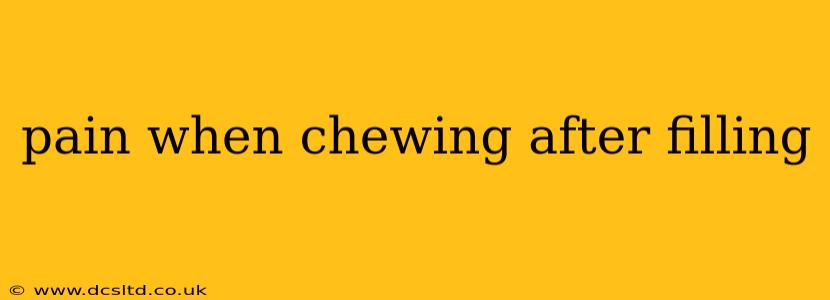Experiencing pain when chewing after getting a filling is a common concern, but it's important to understand the potential causes and when to seek professional dental care. This discomfort can range from mild sensitivity to sharp, throbbing pain, significantly impacting your ability to eat comfortably. This comprehensive guide will explore the various reasons behind post-filling pain, offer potential solutions, and provide preventative measures to avoid future issues.
Why Does My Tooth Hurt After a Filling?
Post-filling pain can stem from several factors. Let's examine the most frequent causes:
1. Irritation of the Tooth's Nerve:
During the filling procedure, the drilling process and the placement of the filling material can sometimes irritate the tooth's nerve, causing sensitivity and pain, especially when chewing. This irritation is usually temporary, subsiding as the tooth heals.
2. High Filling:
If the filling is placed too high, it can put pressure on your teeth when you bite down, leading to discomfort and pain. This is a relatively common issue that can be easily corrected by your dentist.
3. Tooth Fracture:
In some cases, a pre-existing crack or fracture in the tooth might have been exacerbated during the filling process, resulting in pain when chewing. This requires a more thorough examination and potentially different treatment.
4. Infection or Inflammation:
Although less common, an infection or inflammation around the tooth can occur after a filling, causing pain and discomfort. Symptoms may include swelling, redness, and pus. This necessitates prompt dental attention.
5. Sinus Issues:
Sometimes, pain in the upper teeth can be referred pain from a sinus infection. While not directly related to the filling, it's important to rule out this possibility.
6. Sensitivity to the Filling Material:
While rare, some individuals might have an allergic reaction or sensitivity to the materials used in the filling. This usually manifests as a persistent, rather than transient, pain.
How Long Does Post-Filling Pain Last?
The duration of post-filling pain varies greatly depending on the cause. Mild sensitivity often resolves within a few days to a couple of weeks. However, persistent or severe pain warrants immediate attention from your dentist.
What Can I Do for Pain After a Filling?
For mild, temporary discomfort, over-the-counter pain relievers like ibuprofen or acetaminophen can provide relief. Applying a cold compress to the affected area can also help reduce swelling and pain. Avoid chewing on the affected side until the pain subsides.
When Should I See a Dentist After a Filling?
You should contact your dentist immediately if you experience:
- Severe pain that doesn't subside after a few days.
- Swelling or redness around the tooth.
- Pus or discharge from the gum.
- Persistent throbbing pain.
- Increased sensitivity to hot or cold.
How Can I Prevent Pain After a Filling?
- Choose a reputable dentist: A skilled and experienced dentist minimizes the risk of complications.
- Maintain good oral hygiene: Regular brushing and flossing help prevent infection.
- Follow post-operative instructions: Your dentist will provide specific instructions; adhere to them carefully.
- Avoid biting down hard on the affected tooth immediately after the procedure.
Is it Normal to Have Sensitivity After a Filling?
Some degree of sensitivity is common immediately after a filling, but it should gradually diminish. However, prolonged or severe sensitivity is not normal and necessitates a follow-up visit to your dentist.
Can I Eat Normally After a Filling?
It’s best to avoid chewing on the affected side for at least 24 hours after the filling procedure. After that, you can gradually resume normal eating, but avoid excessively hard or sticky foods initially.
By understanding the potential causes of pain after a filling and seeking professional help when necessary, you can ensure a comfortable recovery and maintain healthy teeth. Remember, prevention through proper oral hygiene and choosing a skilled dentist plays a crucial role in minimizing the risk of complications.
